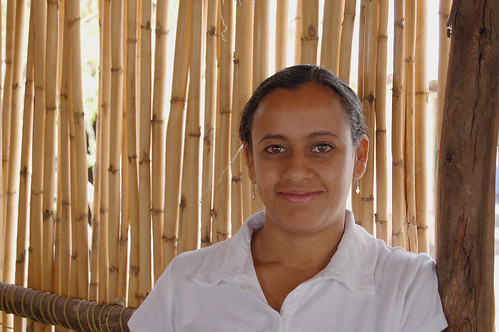
"Women can't think." That's what Elizabeth Milton was told the first time she visited the Afar Region. She'd been recently hired by Support for Sustainable Development, a non-profit organization with a mission to help the Afar people build more sustainable livelihoods in the drought-prone Afar region of Ethiopia by building water diversion projects to irrigate newly developed farmland. The Afar people are traditionally nomadic people who follow their livestock from one grazing area to the next. With drought occurring increasingly more frequently, however, and more and more people and livestock competing for the same forage space, their livelihoods are becoming less viable every year.
The men of the local village had gathered to meet with Elizabeth to discuss the development of canals and irrigation systems. She asked to hear from the women, but was told in no uncertain terms that here in the Afar, women could not be trusted to have opinions or thoughts on important issues such as water resources. They could be relied on to do much of the manual labour, like hauling water, building houses, herding livestock, and providing food for their families, but they could not think. Men did the thinking for them.
"That's why I decided to stay," Elizabeth told me when I asked her what had motivated her to spend the last three years in a remote camp, far from her family and friends, in harsh desert conditions. "I had to prove to them that women really can think." There was a twinkle in her eye when she said it.
At the base camp in the Afar region, Elizabeth leads a staff that varies from 50 to 80 people, depending on the stage of the project they're working on. In addition to the paid staff, who fill roles such as agronomists, engineers, and construction site supervisors, there are hundreds of local labourers who dig ditches and build dams in exchange for food to feed their families. The project is impressive in its scale and it's difficult to imagine what it would take to lead such an operation.
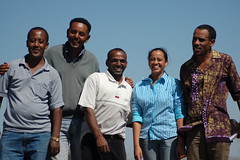
Elizabeth is not what you'd expect when you think of a bold female leader out to change the world. She's petite and shy, with an easy smile on her attractive face. When we visited her and her team, at first glance she could easily have been mistaken for one of the kitchen staff. Demanding no special attention or honour as "the boss", she quietly went about ensuring that we had cold beverages to refresh us after our journey, and could later be found grinding coffee and washing our dishes.
She's only twenty-four years old, but already she's done more to change the world than many people do in a lifetime. "I love my country," she told me, when I asked why she'd pursued a career in development. "I know we are capable of great things. But we must first ensure that our people have enough to eat. If Ethiopia has any hope for the future, it has to be in its own people."
Though she's clearly passionate about her work, Elizabeth's three years in the Afar have been fraught with challenges. There were multiple counts against her, in those early days. Not only was she a woman, she was young and seemingly inexperienced. In addition, she's a Christian in a predominately Muslim region. Building trust among the locals took a considerable amount of energy and commitment. "It was very hard at the beginning," she said. "Nobody really believed I could do it. I often felt like I was in over my head, and I was lonely. And I didn't always believe it would work." Plus, coming from another region of Ethiopia, she didn't know the local language. In order to work with the Afar people, she had to first learn their language.
Despite the challenges, the marks of success of Elizabeth's three years of leadership are not hard to find. First of all, there are the obvious signs, like an impressive water diversion system which consists of a well engineered water weir that redirects the water from the river, as well as miles and miles of irrigation ditches. All of this has been dug by manual labour. Where the water has been diverted and the crops have been planted, there are lush gardens that would be the envy of any gardener. While we were there, they'd just harvested some of the biggest red onions I've ever seen. There were also juicy tomatoes, spicy red peppers, and acres and acres of maize and grain.
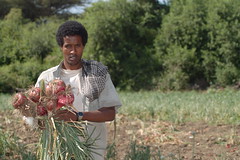

The real success, however, goes much deeper than the harvest from the fertile, freshly watered soil. While we toured the gardens, we were introduced to two women who are members of the local water-users committee, which is now one of the most important governing bodies in the region. To understand how remarkable it is to have women playing these roles, you have to realize that before Elizabeth's arrival, no woman had ever served in a leadership role in this region before.
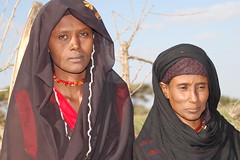
"I like to think I influenced the people here," says Elizabeth, who's almost too modest to admit she's changing the world. "They now believe that women can think. Before I came, they didn't trust their women. But now that they see their bountiful crops, and they realize that this is partly because a woman lead them in this endeavour, they have begun to trust their wives and sisters to serve in leadership roles."
Another sign of succes is the new village that's recently sprung up around the SSD base camp. It's a sign of trust and acceptance that the Afar people choose to be near the staff who brought change to their region. Often wary of Christians, particularly those who come from other regions of the country, these people have made a leap of faith moving in next door. New business has already begun to emerge as well. In a tiny shop in front of a woman's home, you can now by fabric, candles, and various other household items. Another important sign of positive change is the increased enrolment in school. When SSD first began working in the region, only one child attended the local school. Now there are nearly fifty.
In the evening, after we'd visited the canals and field that had all been developed under Elizabeth's leadership, we were invited to the village school where a group of young women and men gathered to perform their local dance. While we watched, several young school children clustered around Elizabeth. Affectionately, she put her arms around one of the young girls. It was a simple gesture, but to me it was the picture of hope.
In many ways that they don't understand yet, the future looks much brighter for these young girls than it did before Elizabeth Milton arrived in their village. Some day, Elizabeth will be only a distant memory, but when they have opportunities to take on more and more leadership roles, they will have her to thank.
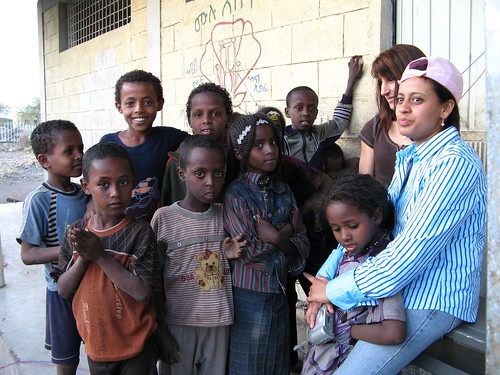


6 comments:
I'm moved. This is so pleasing to read when we hear nothing but the horrible deeds coming from nearby places.
God Bless Her and Keep Her and Multiply Her Work.
What a remarkable woman this young Elizabeth is. Her courage and determination is an inspiration to all women, everywhere.
A remarkable woman and a beautifully-written post. Thanks for sharing her story.
A remarkable woman and a beautifully-written post. Thanks for sharing her story.
I'm always thankful for taking the time to read your posts.
I teach Missionettes on Wed Nights at our Church. Our motto is "Changing the World one girl at a time."
I want to know Elizabeth.
These people are so beautiful in so many ways.
Post a Comment